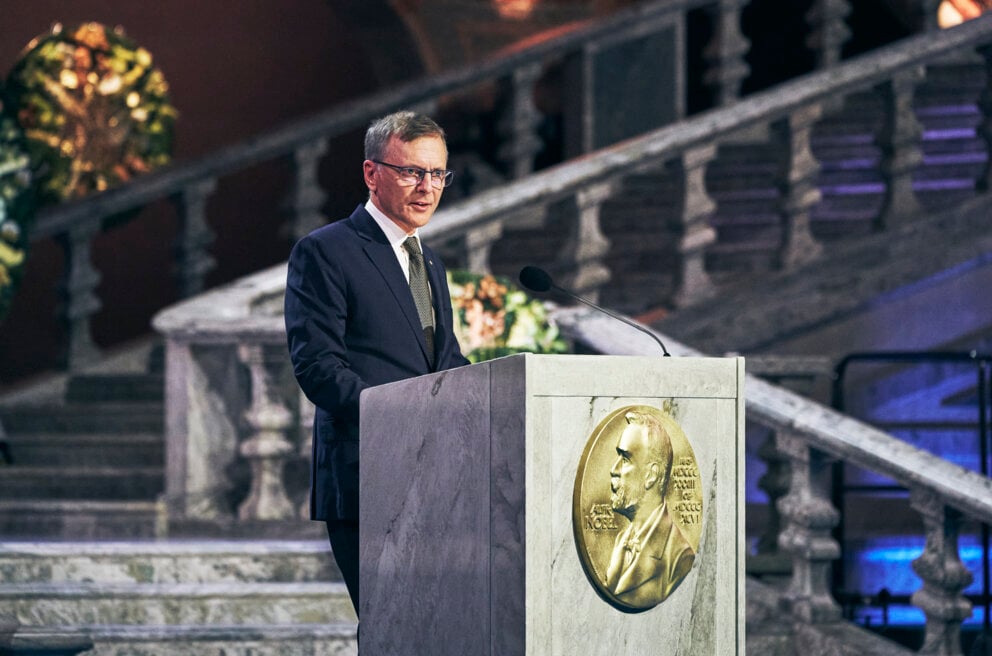Award ceremony speech

Professor Patrik Ernfors delivering the presentation speech for the 2021 Nobel Prize in Physiology or Medicine.
© Nobel Prize Outreach, photo: Dan Lepp
English
Swedish
Presentation Speech by Professor Patrik Ernfors, Member of the Nobel Assembly at Karolinska Institutet, Member of the Nobel Committee for Physiology or Medicine, 10 December 2021
Your Majesties, your Royal Highnesses, Esteemed Nobel Prize Laureates, Ladies and Gentlemen,
One of the great mysteries of humankind is the question of how we sense our environment. We can see the brilliance of colours, enjoy the taste of the food we eat, listen to sounds, and bask in the myriad of odours and fragrances that surrounds us. Over the years, patient research has discovered the gatekeepers of these senses: photoreceptors in the eyes, taste receptors in the mouth, the intricate structures of the inner ear and the odorant receptors of the nose. However, we are also equipped with another sense by which we experience the world: The ability to feel temperature and touch. The body-based sense of temperature and touch is needed for us to be able to perceive the nuanced and rich world around us. Forged through millions of years of evolution, it is highly sophisticated and has incredible sensitivity and precision.
It had been known for a long time that nerves present in our skin and organs are responsible for extracting information about our environment, but a crucial unsolved question remained; what are the sensors that allow the nervous system to detect temperature and touch?
The discovery of temperature sensors began with an interest in the chemical compound capsaicin in chili peppers, which gives rise to the hot and burning sensation experienced when eating spicy food. David Julius, after a diligent search, identified the sensor for capsaicin. When Julius investigated its ability to respond to heat, he realised that he had discovered a heat-sensing receptor. Through this discovery and the work that followed, Julius has provided insights about how we can gain awareness of ambient temperatures, such as feeling a hot cup of tea, the coolness of a shower and pain when touching a hot stove. That feeling of pain warns us of the occurrence or threat of bodily injury. Without this ability, we would be unable to protect ourselves from what is harmful.
The discovery of temperature sensors was a great breakthrough, but the mechanism for sensing touch remained an enigma. Ardem Patapoutian discovered after strenuous efforts a novel class of proteins specifically tuned to respond to mechanical stimuli. The discovery by Patapoutian of the elusive sensor explains how our nervous system can detect touch and pressure. This explains, for example, how we can perceive objects we explore with our fingertips. It also equips us with a “sixth” sense which allows us to keep track of where our limbs are in space. Without this ability we would be unable to manoeuvre our arms and legs, for example while walking or when drinking that cup of hot tea.
The 2021 Nobel Prize laureates have explained fundamental mechanisms underpinning how we sense the world within and around us. Our temperature and touch sensors are used all the time in every day of our lives. They continuously keep us updated about our environment, and without them even the simplest of our daily tasks would be impossible to perform.
David Julius and Ardem Patapoutian, you have answered one of the most fundamental questions in human physiology. Your discoveries represent a paradigm shift in our understanding of how we can perceive and interact with our surroundings. On behalf of the Nobel Assembly at Karolinska Institutet, it is my great pleasure to convey to you our warmest congratulations.
Copyright © The Nobel Foundation 2021
Nobel Prizes and laureates
Six prizes were awarded for achievements that have conferred the greatest benefit to humankind. The 12 laureates' work and discoveries range from proteins' structures and machine learning to fighting for a world free of nuclear weapons.
See them all presented here.
